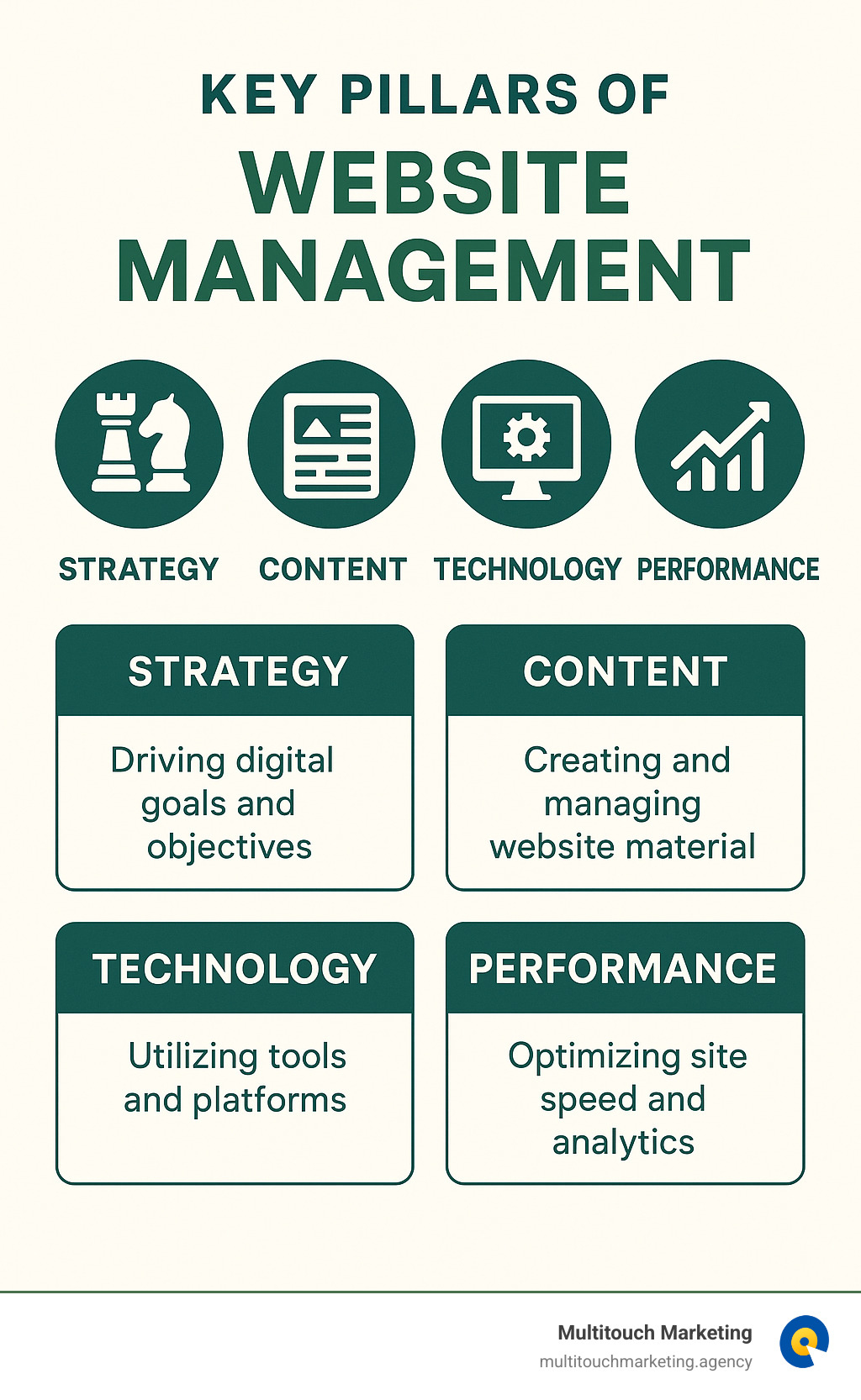The Digital Architect of Online Success
A website manager oversees all aspects of a website. This includes its performance, content, and security. They ensure the site meets business goals and provides a great user experience.
Here are the primary responsibilities of a website manager:
- Ensuring smooth functionality: Keeping the website running efficiently.
- Managing content: Overseeing updates, creation, and organization.
- Implementing security: Protecting the site from threats and maintaining data privacy.
- Analyzing performance: Monitoring traffic, speed, and user behavior.
- Optimizing user experience (UX): Making the site easy and pleasant to use.
- Driving digital strategy: Aligning the website with marketing goals, including SEO and PPC.
This role combines technical knowledge with strategic thinking. It’s vital for any business seeking strong online visibility.
I’m Milton Brown, a digital marketer with over a decade of experience. I’ve managed complex digital campaigns and optimized online presences for various organizations, giving me a deep understanding of the website manager role. My insights ensure a comprehensive view of how websites contribute to measurable business outcomes.
The Core Responsibilities: What Does a Website Manager Actually Do?
A website manager acts as the director of a company’s online presence, blending technical skill with creative, strategic thinking. Their primary goal is to ensure the website functions flawlessly and actively contributes to business objectives. This involves a dynamic mix of planning, execution, monitoring, and optimization.
Key responsibilities include:
- Strategic Planning and Operations: The manager develops and implements the website strategy, aligning it with the broader online marketing plan. They oversee daily operations, ensuring the site runs fast and smoothly by keeping software updated, fixing issues like broken links, and optimizing for all devices. They proactively analyze website data to make informed decisions that improve user engagement and help reach business goals.
- Content Lifecycle Management: This involves managing all website content from creation and editing to archiving or removing outdated information. The goal is to ensure all content is fresh, relevant, and consistent with the company’s brand voice and messaging.
- Technical Performance and Security: A manager regularly tests the website for quality and efficiency. They manage technical assets like domain names and hosting and have a working knowledge of HTML, CSS, JavaScript, and various Content Management Systems (CMS). Website security is a top priority; they implement robust security measures, run regular audits, and respond quickly to any threats to protect company and user data.
- User Experience (UX) and Brand Alignment: A core focus is optimizing the User Experience (UX) to make the site easy and enjoyable to use. A bad experience can be costly, as 88% of consumers are less likely to return to a site after a poor one. They ensure the website’s design and functionality accurately reflect the brand’s identity and work closely with developers, designers, and marketers to maintain a cohesive online presence.
The Critical Role of SEO and Performance
Search Engine Optimization (SEO) is an essential part of a website manager’s toolkit. The primary goal is to increase organic traffic and engagement through smart SEO and SEM strategies.
This starts with a solid SEO strategy, built on thorough keyword research and on-page optimization of the site’s content, titles, and meta descriptions. Regular technical SEO audits are performed to find and fix issues like broken links or site structure problems that could harm search visibility.
Website performance is directly tied to SEO. Key metrics like page load speed, bounce rates, and conversion rates are constantly monitored. Since 41% of consumers will stop viewing a site that takes too long to load, page speed is a critical focus. A slow site frustrates users and hurts search rankings. Furthermore, websites must be mobile responsive, as a huge portion of traffic comes from mobile devices. We ensure our sites are built with strong Responsive Web Design principles.
At Multitouch Marketing, we believe SEO Search Engine Optimization is about connecting businesses with the right audience. A skilled website manager uses analytics to continuously refine the site, improve user engagement, and boost conversions, always remembering that Slow loading is a top reason consumers leave a site.
Managing Content and Ensuring Brand Consistency
The website manager serves as the brand’s lead storyteller and guardian of its online identity. They ensure every piece of content is accurate, engaging, and aligned with the brand’s voice and visual style.
This process begins with regular content audits to evaluate existing content, identify what needs to be updated or removed, and keep the site effective. Content creation is an ongoing effort, where the manager may write and edit content or collaborate with a team to develop new material. They also manage publishing schedules to ensure a steady flow of fresh information.
Proficiency with Content Management Systems (CMS) like WordPress is essential for managing content efficiently. The manager uses the CMS to update pages, add plugins, and organize the site’s structure. Most importantly, they ensure the website’s content and design are perfectly aligned with the overall brand strategy, working with marketing teams to create a consistent and trustworthy user experience. Our Website Maintenance and Support services ensure these high standards are consistently met, and we provide expert SEO Content Optimization Tips to make your content shine.
Common Challenges Faced in the Role
The role of a website manager comes with a unique set of challenges that test their skills and adaptability.
- Keeping Up with Technology: The digital landscape evolves rapidly. A manager must constantly learn about new design trends, development tools, security threats, and search engine algorithms.
- Managing Security Threats: Websites are constant targets for cyberattacks. A manager must remain vigilant, implementing strong security protocols and responding immediately to any breaches.
- Balancing Stakeholder Requests: The manager often acts as a liaison between multiple departments (marketing, sales, IT), each with its own priorities for the website. Balancing these requests while maintaining a clear strategy requires excellent communication and negotiation skills.
- Budget and ROI: Working within budget constraints is a common reality. Managers must find creative, cost-effective solutions and be able to demonstrate the return on investment (ROI) for website initiatives.
- Troubleshooting Technical Issues: Even well-maintained sites can experience problems like broken links, slow load times, or compatibility issues. A manager needs strong problem-solving skills to diagnose and fix technical issues quickly to minimize disruption for users.
Building Your Skillset: The Essential Qualifications and Competencies
Becoming a website manager requires a diverse toolbox of skills. Employers value practical experience and a strong blend of competencies that bridge the gap between a website’s technical foundation and the strategic vision that drives a business.
The role has evolved significantly over time, as shown below:
| Feature | Webmaster (Traditional) | Website Manager (Modern) |
|---|---|---|
| Primary Focus | Technical maintenance, server administration, coding. | Strategic alignment, content, UX, marketing, technical oversight. |
| Scope | More hands-on, limited to technical upkeep. | Broader, includes business objectives, user engagement, and growth. |
| Key Skills | HTML, CSS, FTP, server config, basic scripting. | CMS, SEO, analytics, content strategy, project management, soft skills. |
| Marketing Role | Minimal, often separate from marketing efforts. | Integral to digital marketing strategy (SEO, PPC, content). |
| Decision-making | Reactive, focused on fixing immediate technical issues. | Proactive, data-driven, focused on long-term website growth. |
| Collaboration | Often isolated, works with IT. | Highly collaborative, works with marketing, sales, IT, design. |
This table shows the shift from a purely technical “webmaster” to a comprehensive website manager who is central to a company’s digital strategy. A successful manager blends technical skills, soft skills, marketing acumen, project management abilities, and sharp analytical thinking.
Essential Technical and Marketing Skills for a Website Manager
A solid technical foundation is crucial. This includes understanding the basics of HTML, CSS, and JavaScript. While daily coding may not be required, this knowledge is vital for troubleshooting and collaborating with developers.
Proficiency with Content Management Systems (CMS) like WordPress, Drupal, or Joomla is non-negotiable. A manager must be an expert at using these platforms to manage content, plugins, themes, and user permissions.
Web analytics tools like Google Analytics are the manager’s eyes and ears. The ability to interpret data on visitor behavior is essential for making informed decisions that improve the user experience and guide content strategy.
A deep understanding of SEO principles is also critical, from keyword research to on-page and technical optimization. While Multitouch Marketing excels at PPC Pay Per Click Campaigns, a website manager often works with marketing teams on these efforts, ensuring landing pages are optimized and tracking codes are implemented correctly.
Here are the key types of tools a website manager should master:
- Content Management Systems (e.g., WordPress, Drupal, Joomla)
- Analytics Platforms (e.g., Google Analytics, Adobe Analytics)
- SEO Tools (e.g., Semrush, Ahrefs, Google Search Console)
- Project Management Software (e.g., Asana, Trello, Jira)
- Security Scanners (e.g., Sucuri, Wordfence)
Key Competencies and Qualities for Success
Beyond technical skills, certain soft skills and personal qualities distinguish a great website manager.
- Problem-Solving and Attention to Detail: Websites are complex, and issues are inevitable. The ability to quickly diagnose and fix problems is priceless. This requires a sharp eye for detail to ensure all content, links, and design elements are perfect.
- Adaptability and Curiosity: The digital world changes constantly. A manager must be flexible, open to new ideas, and continuously learning about the latest trends in web design, development, and marketing.
- Strong Communication Skills: As the hub between technical and business teams, a manager must translate complex information into clear, understandable language for developers, marketers, and executives alike.
- Strategic Thinking: A great website manager thinks beyond daily maintenance. They focus on how the website can drive business growth, attract users, and increase revenue. This strategic mindset is improved by embracing Data-Driven Marketing Strategies, ensuring every decision is backed by evidence.
The Website Manager Career Path: Salary, Trends, and Future Outlook
The career path for a website manager is dynamic and full of opportunity, reflecting the critical importance of a strong online presence for modern businesses. This role offers significant growth in both responsibility and earning potential.
As the digital landscape expands, so does the demand for skilled professionals who can manage a company’s most important digital asset. The career trajectory can lead from an entry-level role like Web Content Coordinator to website manager, and onward to senior leadership positions like Director of Web Strategy or VP of Digital Experience.
Understanding the Website Manager Salary
The salary for a website manager in the United States is competitive and can vary significantly based on several factors. Entry-level positions may start around $60,000 per year, while the national average salary often falls in the $80,000 to $90,000 range. Experienced website managers, particularly those in major tech hubs or with in-demand specializations, can command salaries well over $120,000 annually.
Several factors influence a website manager‘s remuneration:
- Experience: More years in the role with a proven track record of success directly translates to higher earning potential.
- Specialization: Expertise in high-demand areas like advanced SEO, e-commerce platforms, or UX design can significantly boost salary.
- Geographic Location: Salaries vary by state and city. Major metropolitan areas like those in North Carolina’s Research Triangle tend to offer higher compensation due to increased demand and cost of living.
- Educational Qualifications & Certifications: While experience is key, a relevant bachelor’s degree and professional certifications (e.g., Google Analytics, PMP) can improve career prospects.
- Company Size and Industry: Larger organizations or those in high-growth industries like tech and e-commerce often offer more competitive salary packages.
Future Trends and Job Outlook
The job outlook for website managers is incredibly positive. As businesses continue their digital change, the need for professionals to manage these critical online assets will only grow.
The role itself is evolving to be more strategic. Managers are increasingly involved in shaping an organization’s overall digital presence, relying on data to drive decisions. The rise of AI is another key trend, as managers will need to leverage AI tools for tasks like content personalization and performance optimization, a core part of the AI-Driven Digital Change changing industries.
An intensified focus on data privacy and security will also shape the role, requiring managers to ensure compliance with regulations. Finally, opportunities for specialization in areas like e-commerce, UX, mobile optimization, and voice search will continue to grow, making adaptability and continuous learning key to long-term success.
Frequently Asked Questions about the Website Manager Role
People often have questions about the website manager role. Let’s clarify some of the most common points of confusion.
What are the key differences between a webmaster and a website manager?
These terms are often used interchangeably, but their focus is different. A webmaster traditionally handles the technical nuts and bolts: server administration, coding fixes, and ensuring the site stays online. It’s a reactive, maintenance-focused role.
A website manager has a much broader, more strategic scope. While they oversee the technical aspects, they also manage content strategy, SEO, user experience (UX), and analytics. They work proactively to align the website with business goals, drive growth, and improve performance. In many organizations, the website manager sets the vision and may supervise a team that includes webmasters or developers.
What role does PPC play in a website manager’s responsibilities?
A website manager plays a crucial, behind-the-scenes role in the success of PPC Pay Per Click Campaigns. While a marketing team might create the ads, the manager ensures the post-click experience is effective.
Their responsibilities include:
- Optimizing Landing Pages: They create and refine the landing pages that turn ad clicks into conversions.
- Implementing Tracking: They ensure that essential tracking codes, like the Facebook Pixel or Google Ads tags, are installed correctly to measure campaign performance.
- Analyzing User Behavior: They analyze how visitors from paid ads interact with the site, identifying and fixing any UX issues that cause users to leave. A skilled manager ensures the investment in PPC yields a positive return.
What are the first steps to becoming a website manager?
You don’t need a computer science degree to start. This field values practical skills and experience.
- Build a Technical Foundation: Get comfortable with web basics like HTML, CSS, and, most importantly, a popular CMS like WordPress. This is where you’ll spend most of your time.
- Get Hands-On Experience: Create your own website or volunteer to manage one for a local nonprofit or small business. This practical application is the best way to learn and build a portfolio.
- Develop Strategic Skills: Master the principles of Search Engine Optimization, learn Google Analytics inside and out, and practice creating engaging content. These skills are what make you truly valuable.
- Consider Certifications: Earning certifications in key tools like Google Analytics shows you’re serious about professional development in a constantly changing field.
The most successful managers are curious problem-solvers who are passionate about creating great user experiences. If that sounds like you, you’re on the right path.
Conclusion: Mastering the Art of Digital Presence
The website manager is a vital force in the digital world, acting as the architect behind a business’s online success. They blend technical expertise, strategic thinking, and creative problem-solving to manage every aspect of a website—from performance and security to content and user experience.
This role demands a unique mix of skills to ensure a website is not just a static online brochure, but a dynamic tool that attracts customers, generates leads, and supports business growth. Their ability to adapt to new technology and align the website with brand goals makes them invaluable.
At Multitouch Marketing, we understand the synergy between expert website management and successful digital marketing. Our specialization in PPC advertising complements the work of a great website manager, ensuring every part of your online presence is optimized for peak performance and outstanding results.
Ready to lift your digital strategy? Find how Multitouch Marketing can help you achieve your online goals and truly master the art of digital presence. Learn more about our Website Management Companies.



